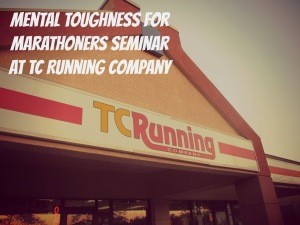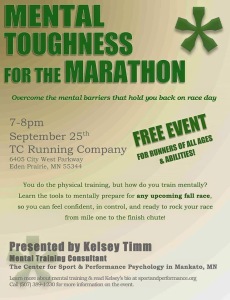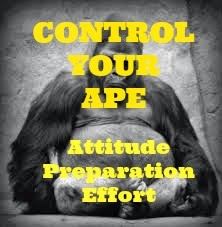I’ll do my best to quickly summarize what we talked about but I think you could benefit the most from attending yourself the next time they host it! TC Running Company plans to bring the same group back in the future, maybe around Boston or Grandma’s Marathon time next spring. I recommend checking it out!
Let go of what you can’t control…
First, we talked about issues that are within your circle of control and those that are outside of it. You have to learn to let go of all the things that are outside of your control and focus on the things you can actually control. You can focus on how you react to the things outside of your control but you can’t spend precious energy stressing about them.
Examples of things outside your control (in running): weather, spectators, course, stomach issues, cramps, logistics, injury, competition, traffic…
What you should spend your energy focusing on is controlling your APE!
E- Effort
Your “APE” consists of the three factors that you can control when racing- your attitude, your preparation, and your effort. You can control your attitude (positive mantras!), you can control your training (how well you’ve prepared) and you can control your race effort.
When you get to the start line, do not focus on the training you didn’t do. Focus on the training you DID do. Think about the awesome runs that you had!
Train Your Brain..
- Use imagery- picture yourself succeeding.
- Run through your race plan in your head.
- Mentally prepare yourself to keep good form when the discomfort comes.
- People must experience a 3:1 ratio of positive emotions to negative ones to flourish.
- Be aware of what’s going through your head.
- 70% of people’s 60,000 thoughts a day are negative!
- Realize that you will have negative thoughts, but you will chose not to listen.
- Replace the negative thought with a positive thought.
- Great athletes talk to themselves; they don’t listen to themselves (at least not the negative!)
- Focus on something motivating, something good, something positive.
- Work to reframe the negative into positive. “I can’t do this”- change it to “I have trained for this. I am ready.”
Mantras/Create Your Power Phrases
Put your mantra somewhere you can see it. Write it on your arm! (This reminded me of the mental tips that Liz talked about in THIS INTERVIEW.)
Come up with a mantra that works for you. “I am fit, happy, and in control.”
Discomfort is a part of running.
Discomfort is part of pushing your body and doing your best in running.
- Mentally strong runners learn to embrace the discomfort that comes with running
- Make discomfort your alley not your enemy.
- Don’t avoid it; embrace it!
“This is how I know that I’m working hard.”How will you label your discomfort positively?
Name your discomfort and welcome it. Kelsey said a lot of her runners will name their discomfort after a “hot guy”, and when the discomfort comes, you welcome your hot friend joining you on your run,
I apologize that this was sort of a hodgepodge of ideas that I kind of failed to make cohesive…but hopefully something will ring true for you. Like I said, you’d be best off attending one of these seminars yourself and hearing it all first hand from the experts, rather than from my notes.




This is great, Jessie! I always struggle with the mental pieces during my longer runs. I’ll need to re-read this post right before Philly (and probably once or twice before then too)!
Glad you enjoyed it Jenna! I struggle with staying mentally strong when my “Ryan Gosling” arrives too
[…] for a run and I always try to talk about GOING FOR A RUN in a very excited voice. I guess running is mental for dogs too, right? But seriously, I try to praise her during and after a run as much as […]
[…] you have been reading for awhile, you might remember that I went to a similar seminar at TC Running Company last fall. Read all about that one HERE. I found a lot of value in that seminar, so I was excited to attend […]